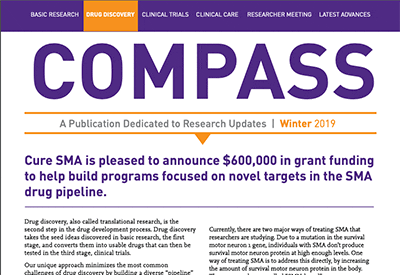
Scholar Rock yesterday announced new quality-of-life (QoL) data from its Phase 2 TOPAZ trial extension period evaluating patient outcomes after 24 months of treatment which indicate stabilization or continued improvement with apitegromab for nonambulatory patients with Types 2 and 3 spinal muscular atrophy (SMA) receiving an SMN-targeted therapy.
The TOPAZ trial assessed activities of daily living (ADL), fatigue, and muscle endurance by three tertiary endpoint measures:
- Nonambulatory Type 2 patients (aged two or older who began receiving nusinersen maintenance therapy before age five) reported stabilization or continuous improvements in ADL up to a mean change from baseline of 3 points (n=14) in PEDI-CAT scores and fatigue up to a mean change from baseline of 5 points (n=10) in PROMIS scores over 24 months of apitegromab.
- Nonambulatory Types 2 and 3 patients (aged five to 21 who began receiving nusinersen maintenance therapy at or after age five) reported stabilization or increases in ADL up to a mean change from baseline of 0.7 points (n=8) in PEDI-CAT scores, and less fatigue up to a mean change from baseline of 3.5 points (n=2) in PROMIS scores over 24 months of apitegromab. Additionally, these patients also experienced trends in improvements in fatigability and endurance measures.
These findings complement previously reported data from the TOPAZ trial 24-month extension period that demonstrated sustained and durable improvements in motor function as measured by the Hammersmith Functional Motor Scale Expanded (HFMSE) and RULM in patients with nonambulatory Types 2 and 3 SMA.
No safety risks were identified over 24 months of treatment. The incidence and severity of adverse events were consistent with the underlying patient population and nusinersen therapy.
Of the 55 patients who completed the 24-month TOPAZ extension period, 54 have opted to continue treatment in the 36-month extension period.
About the Phase 2 TOPAZ Trial
The TOPAZ trial is an ongoing proof-of-concept, open-label Phase 2 trial evaluating the safety and efficacy of apitegromab in patients with Types 2 and 3 SMA. In the main treatment period, patients were dosed intravenously every four weeks as monotherapy or with nusinersen, an approved SMN therapy. The trial enrolled 58 patients in the U.S. and Europe. The primary efficacy endpoints were mean change from baseline in Revised Hammersmith Scale (RHS) score at 12 months for the ambulatory population (Cohort 1), and mean change from baseline in HFMSE score at 12 months for the nonambulatory population (Cohorts 2 and 3). The trial also includes multiple 12-month extension periods designed to evaluate longer-term patient outcomes.
About Apitegromab
Apitegromab is a selective inhibitor of the activation of myostatin and is an investigational product candidate for the treatment of patients with spinal muscular atrophy (SMA). Myostatin, a member of the TGFβ superfamily of growth factors, is expressed primarily by skeletal muscle cells, and the absence of its gene is associated with an increase in muscle mass and strength in multiple animal species, including humans. Scholar Rock believes that inhibiting myostatin activation with apitegromab may promote a clinically meaningful improvement in motor function in patients with SMA. The U.S. Food and Drug Administration (FDA) has granted Fast Track, Orphan Drug and Rare Pediatric Disease designations, and the European Medicines Agency (EMA) has granted Priority Medicines (PRIME) and Orphan Medicinal Product designations, to apitegromab for the treatment of SMA. The efficacy and safety of apitegromab have not been established and apitegromab has not been approved for any use by the FDA or any other regulatory agency.
* This update was featured in a podium presentation today by Basil Darras, M.D., Associate Neurologist-in-Chief, Boston Children’s Hospital and Professor of Neurology, Harvard Medical School, at the 3rd International Scientific Congress on SMA in Barcelona, Spain (SMA Europe 2022).



